Whether you’re balancing studies, managing family commitments, or looking to earn extra income, part-time jobs offer the flexibility you need. But with competition high, your CV has to show that you’re reliable, adaptable, and ready to hit the ground running.
A well-crafted CV proves that even with fewer hours, you’re someone an employer can count on. This guide and its part-time job CV examples will help you create a CV that highlights your experience, availability, and skills in a way that makes hiring you an easy decision.
Part-time retail job CV example
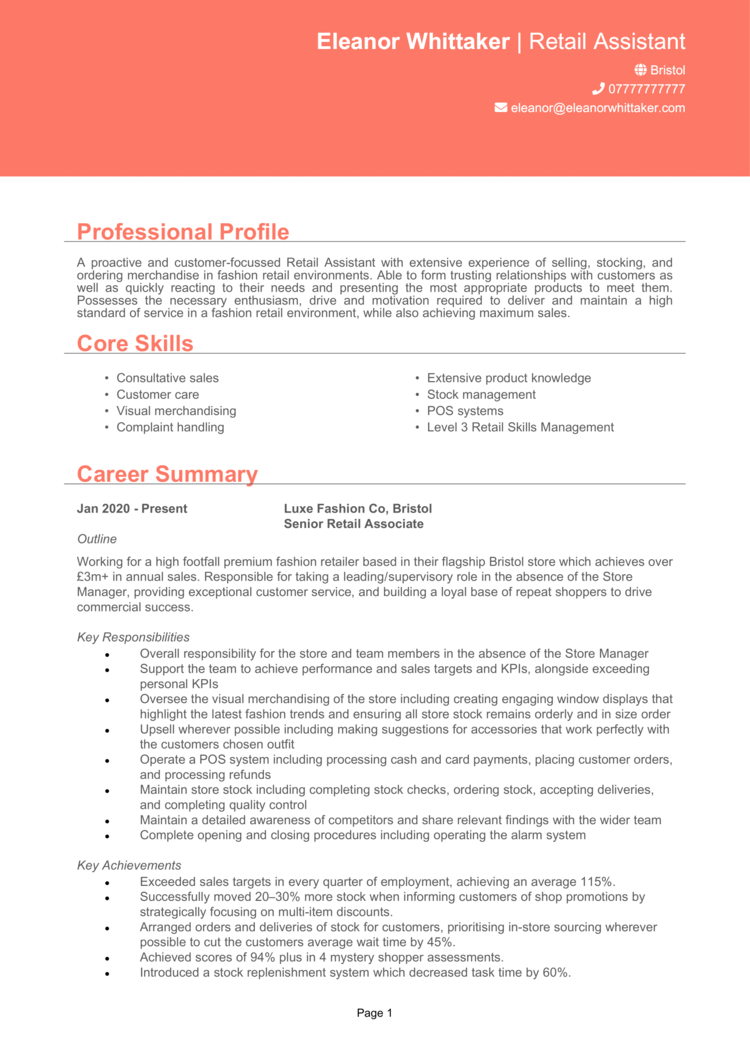
Student CV example
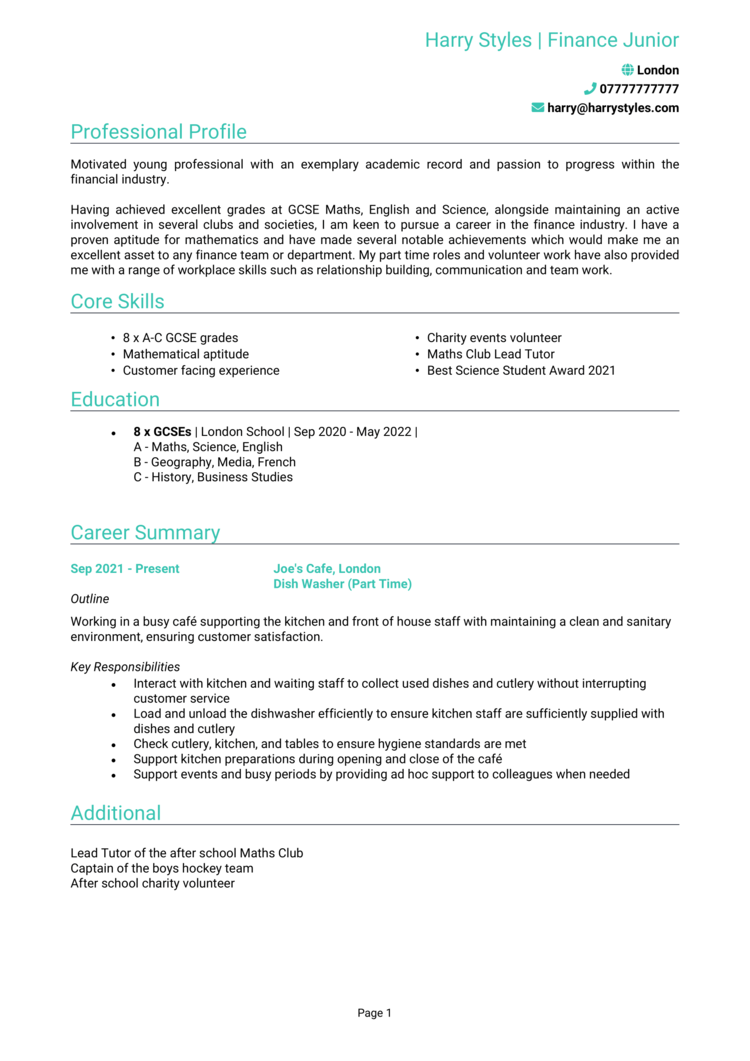
Retail job no experience CV
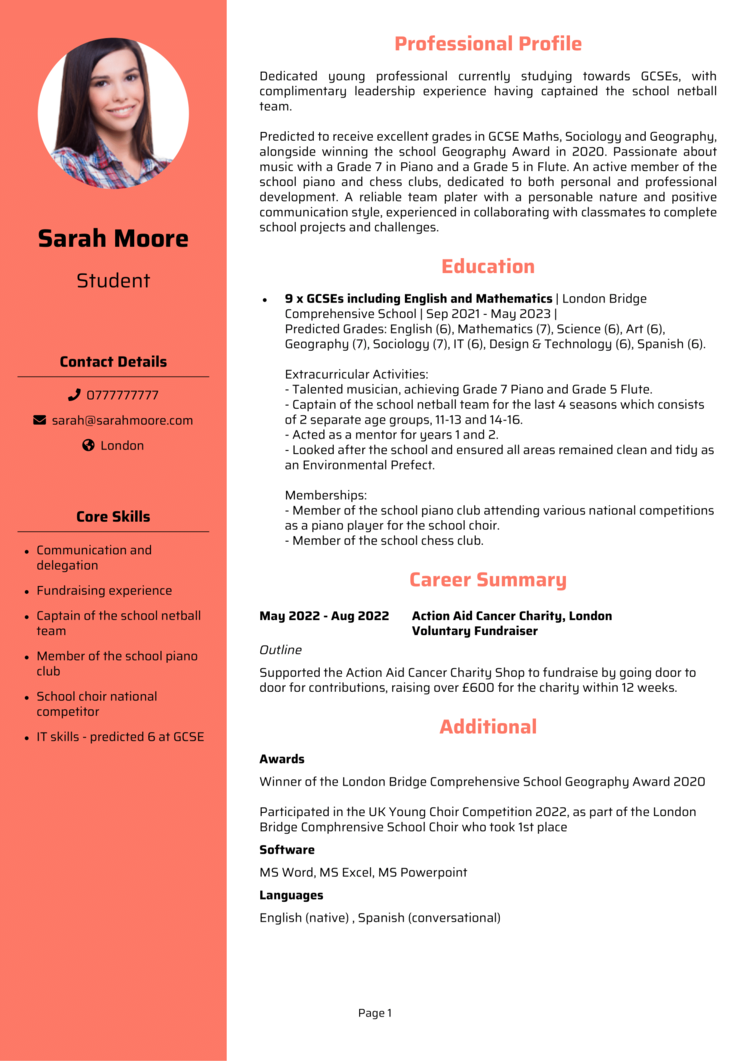
High School Student CV example
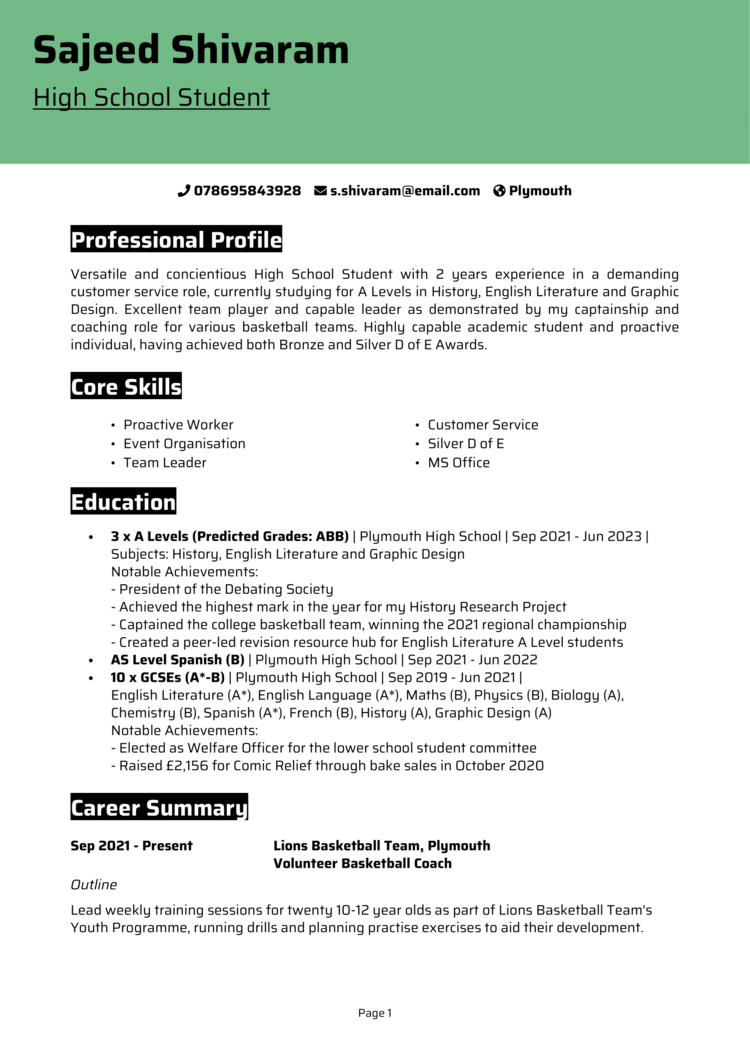
Saturday Job CV example
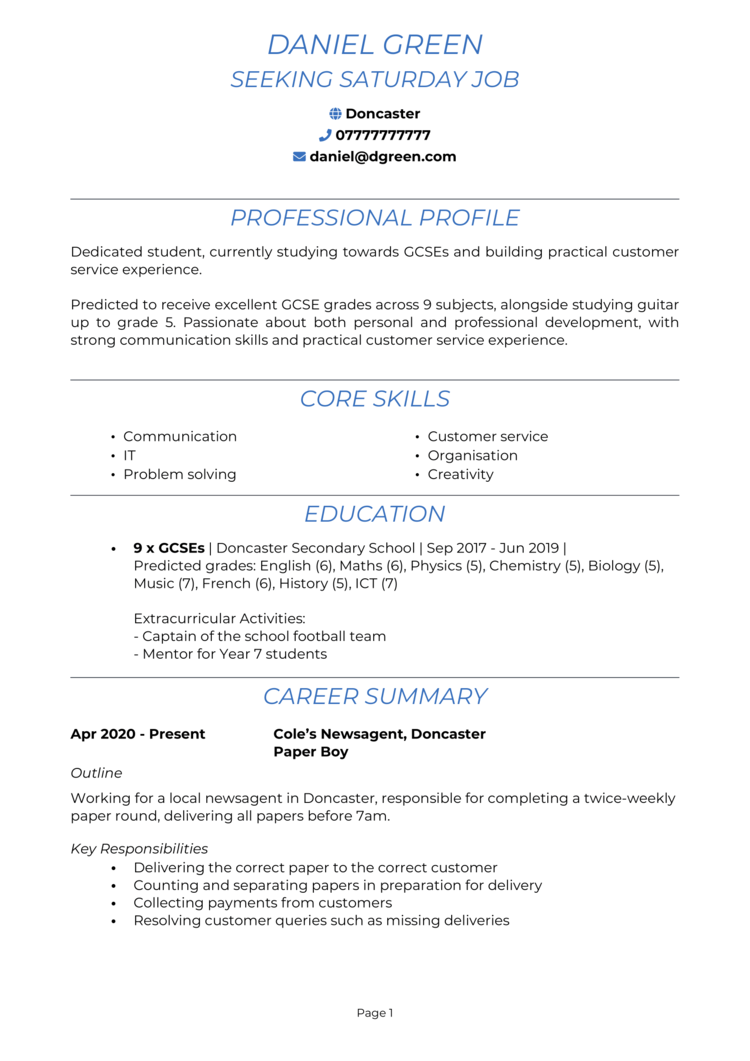
How to write your Part-Time Job CV
Discover how to craft a Part-Time Job CV that lands interviews with this simple step-by-step guide.
Part-time work might not take up a full week, but your CV still needs to be as polished as a full-time application. Employers want to see that you can manage responsibilities efficiently and commit to the role – whether it’s a few hours a week or regular shift work.
This guide breaks down writing a CV for part-time jobs, helping you highlight key skills and the flexibility that makes you a perfect fit. Whether you’re applying for retail, hospitality, office admin, or seasonal work, this guide ensures your CV stands out for all the right reasons.
How to structure your Part-Time Job CV


A clear and organised CV is essential – especially for part-time jobs, where employers often scan applications quickly. Keep your layout simple and professional so they can find the most important details at a glance.
Here’s the best structure to follow:
- Name and contact details – Start with your name and contact details – make it simple for recruiters to reach you. Including a photo is a personal choice.
- Profile – Use this section to summarise your experience, strengths, and what makes you a standout candidate.
- Core skills – Outline the essential abilities that make you a strong candidate.
- Work experience – Walk through your professional experience, beginning with your latest position and moving backwards.
- Education – Outline your qualifications, whether you’re still studying or have completed training or earned certifications like a degree.
- Additional info – This section is optional, but it’s a good place for things like hobbies, volunteering, interests, and awards that complement your CV.
The correct format for a Part-Time Job CV


A quality CV format makes it easier for hiring managers to quickly assess your suitability for the role. Even well-qualified candidates are frequently overlooked purely because of visual mistakes that detracted from their expertise.
Follow these simple formatting tips:
- Bullet points – Use these to present skills and responsibilities clearly.
- Divide sections – Keep each section distinct so information is easy to find.
- Use a clear and readable font – Choose a professional, readable font that keeps the focus on your content.
- No more than 2 pages – This is the ideal length to provide all the essential information while staying concise.
How to create a Part-Time Job CV profile


Your CV profile is a short introduction that sums up why you’re a great candidate for part-time work. It should highlight your reliability and key strengths in just a few sentences. Ultimately, you want to make use of these few lines to really drive home what makes you the candidate a recruiter should hire – so give them the reasons why they should.
Part-Time Job CV profile examples
Profile 1
Reliable and customer-focused Retail Assistant with two years of part-time experience in handling transactions, assisting customers, and managing stock. Skilled in operating POS systems, maintaining store displays, and providing excellent customer service. Adept at working in fast-paced retail environments while ensuring customer satisfaction.
Profile 2
Organised and hardworking Administrative Assistant with part-time experience supporting office operations, data entry, and document management. Skilled in handling phone inquiries, scheduling appointments, and maintaining records. Proficient in Microsoft Office and CRM systems. Passionate about ensuring efficient office workflows and providing administrative support.
Profile 3
Dedicated and proactive Food Service Assistant with part-time experience in restaurant and café environments. Skilled in taking orders, preparing food, and handling cash and card transactions. Knowledgeable about food hygiene standards and customer service principles. Committed to providing a pleasant dining experience for customers.
Details to put in your Part-Time Job CV profile
Here’s what to include:
- Availability – Make it clear that your schedule aligns with the job requirements.
- Relevant experience – Whether it’s customer service, admin, or hands-on work.
- Transferable skills – Mention things like time management, teamwork, and problem-solving.
- Work ethic – Show that you’re dependable and ready to contribute.
- Aspiration – Part-time jobs are often there to get a foot in the door, so express that you ultimately aspire to a full-time job.
Presenting your core skills


Part-time employers want to know what you can bring to the role quickly. Your CV skills section is a quick reference list of your most valuable abilities.
Since part-time jobs vary widely, tailor this section to match the role. A retail assistant might highlight customer service and cash handling, while an office admin role would focus on organisation and IT skills.
Essential skills that recruiters look for in a Part-Time Job CV
- Time Management – Balancing work responsibilities with studies or other commitments to meet deadlines efficiently.
- Customer Service – Assisting customers professionally in retail, hospitality, or service-based roles.
- Cash Handling and POS Operation – Processing transactions, managing payments, and handling refunds accurately.
- Stock Replenishment and Inventory Management – Restocking shelves, organising products, and monitoring stock levels.
- Teamwork and Collaboration – Working effectively with colleagues to ensure smooth day-to-day operations.
- Problem-Solving – Quickly addressing challenges and finding solutions in fast-paced work environments.
- Adaptability and Flexibility – Adjusting to different shifts, roles, and responsibilities as required.
- Communication Skills – Engaging with customers, colleagues, and managers clearly and professionally.
- Basic Computer Proficiency – Using Microsoft Office, POS systems, and online platforms for work-related tasks.
- Health and Safety Compliance – Following workplace safety guidelines and hygiene regulations in retail, hospitality, or office environments.
How to highlight work experience


Employers want to see that you have real-world experience, but that doesn’t mean you need years of full-time jobs under your belt. Even if you’re early in your career, highlight any paid roles, internships, side hustles or volunteering that demonstrate valuable skills.
Walk through your jobs in reverse chronological order, starting with the most recent. Focus on how you’ve applied teamwork, problem-solving, and time management – skills that are key for part-time roles.
If you have limited work experience, mention any freelance work, temporary roles, or volunteering that show you’re responsible and reliable.
How to make your past experience easy to read for employers

- Outline – Introduce the company, your role, and the nature of the work.
- Responsibilities – Highlight key tasks you handled, such as customer service, stock management, or admin duties. Use action words like “assisted,” “supported,” and “managed.”
- Achievements – Show how you made an impact, whether by improving efficiency, receiving positive feedback, or learning new skills.
Example job entries for Part-Time Job
Retail Assistant | Birch Fashion
Outline
For a leading UK retail brand, assisted customers, processed transactions, and managed stock to ensure a smooth shopping experience.
Responsibilities
- Greeted customers, assisted with product selection, and provided style advice.
- Processed cash and card payments using POS systems, ensuring transaction accuracy.
- Restocked shelves and maintained store displays to improve product visibility.
- Handled customer inquiries and resolved complaints in a professional manner.
- Supported sales promotions and loyalty program sign-ups.
Achievements
- Increased customer satisfaction scores by 20 percent through excellent service.
- Consistently met or exceeded daily sales targets.
- Recognised by management for maintaining store presentation and product knowledge.
Admin Assistant | Credence Consultancy
Outline
Within the office of a national consultancy firm, provided administrative support, ensuring smooth daily operations.
Responsibilities
- Managed phone calls, emails, and calendar scheduling for senior staff.
- Assisted with data entry, maintaining accurate client and financial records.
- Prepared reports and organised documents for internal meetings.
- Greeted clients and handled visitor check-ins in a professional manner.
- Ensured office supplies were stocked and reordered when necessary.
Achievements
- Improved record-keeping efficiency by 30 percent by introducing a new filing system.
- Recognised for excellent organisational skills and time management.
- Helped streamline internal communication by assisting with email and report formatting.
Barista | Dunes Cafe and Bakery
Outline
For a popular café chain, assisted in food preparation, customer service, and maintaining hygiene standards.
Responsibilities
- Took customer orders, handled cash and card payments, and managed food delivery services.
- Prepared beverages and light meals, ensuring consistency in quality and presentation.
- Maintained cleanliness in dining areas and restocked food supplies as needed.
- Provided friendly and efficient service, ensuring a positive customer experience.
- Followed food hygiene and safety regulations in all food-handling tasks.
Achievements
- Helped increase sales of promotional items by 15 percent through effective customer recommendations.
- Maintained a 100 percent hygiene rating during internal health and safety audits.
- Recognised by supervisors for consistently delivering fast and friendly service.
Education and qualifications


Your education section should be short and to the point. If you’re a student, list your current course and expected completion date. If you’ve completed school or university, include your highest level of qualification.
You can also mention relevant training or short courses, such as customer service training, first aid, or IT certifications.
If you don’t have much work experience, highlight any coursework, projects, or extracurricular activities that showcase relevant skills like teamwork, organisation, or leadership. Feel free to expand on specific past qualifications which are especially related to the roles you’re applying for.
Qualifications recruiters look for Part-Time Jobs
- Customer Service Training – Essential for retail, hospitality, and front-facing roles.
- Food Safety Certificate (Level 2) – Ideal for catering and food service jobs.
- IT Skills Certification (ECDL, Microsoft Office) – Beneficial for admin or office-based roles.
- First Aid at Work Certificate – A useful addition for customer-facing or event-based jobs.
- Cash Handling and Till Training – Helps if applying for retail or cashier positions.





